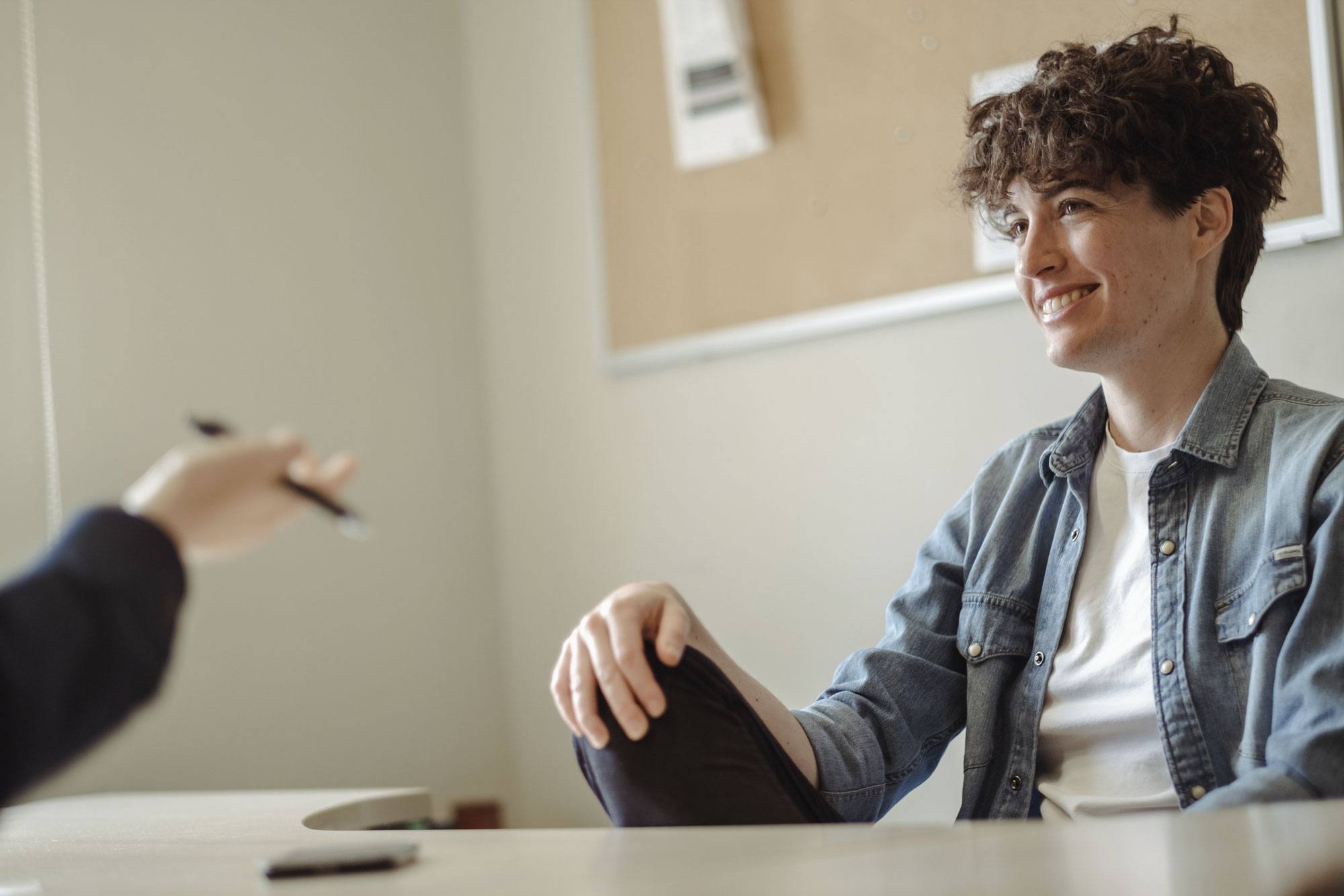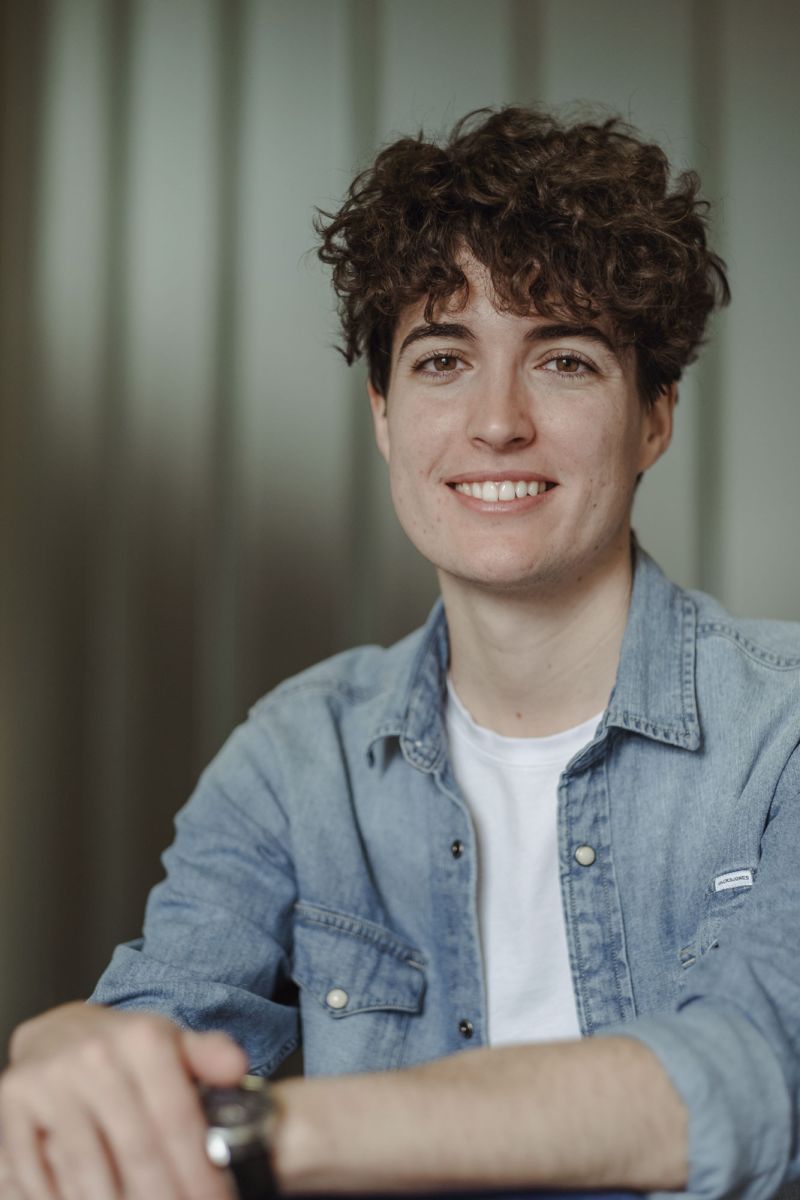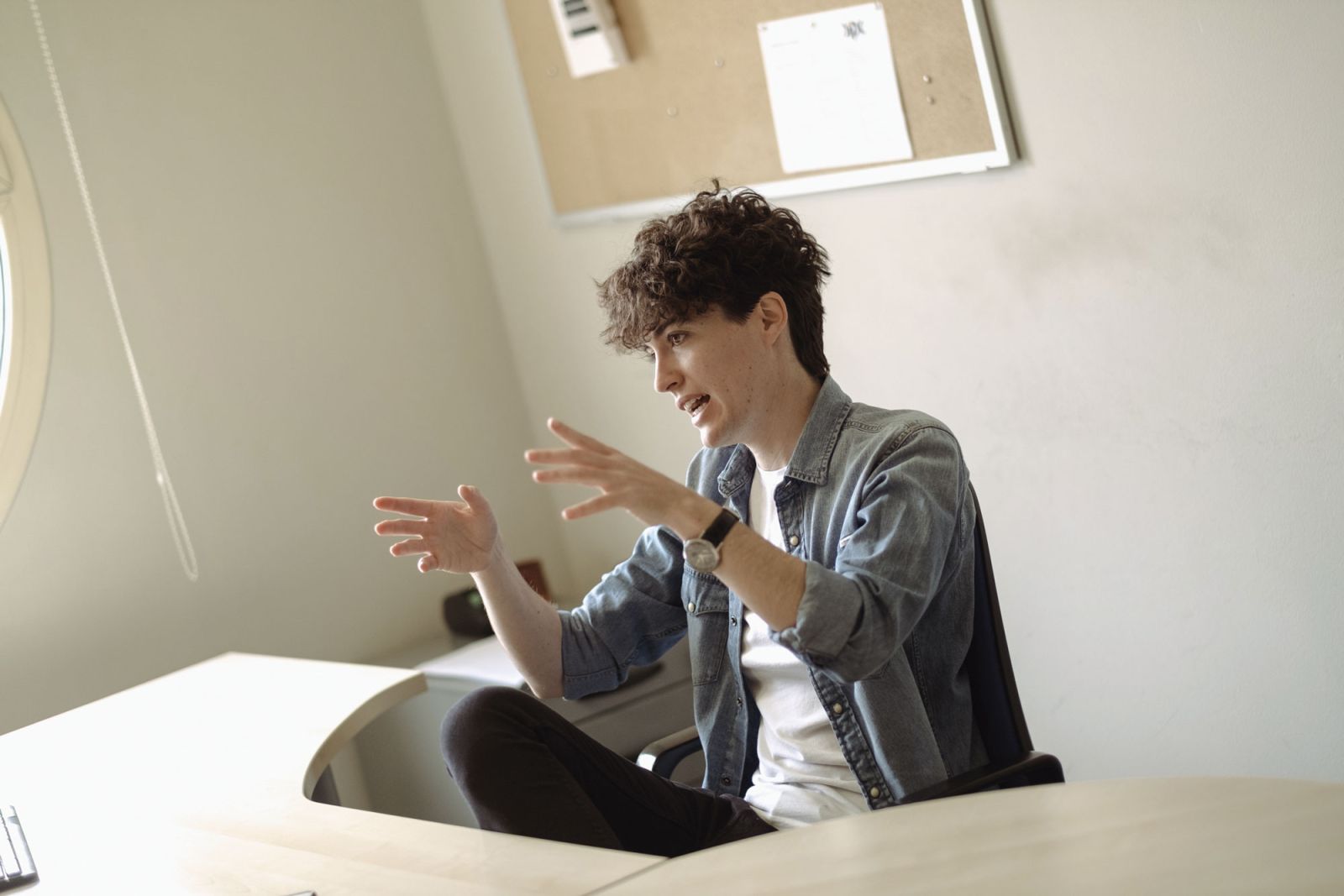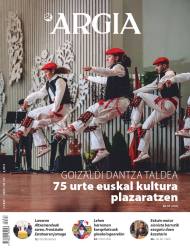"In American education, people think it's better to be monolingual than bilingual."
- Both in language and in the brain, fluidity occupies a prominent place in the perspective of researcher Esti Blanco Elorrieta. “We humans have a huge compulsion to categorize and make very modular theories in everything.” But there are intermediate processes, and not everything is A or B. “One way to look at the world is to see things on a spectrum, rather than seeing them in black or white.” Maybe we could live quieter.

Esti Blanco Elorrieta. Bilbao, 1990
He studied Basque Philology at the University of Deusto and later Master in Cognitive Language Neuroscience at the BCBL in San Sebastian. Since then, it's dedicated to language neurobiology. Her doctoral dissertation at New York University, on linguistic change practices in bilingual people, continues her research on the subject at Harvard University. To learn about their gender view, we invite them to see the interview in the Nonbinary section of Ur Handi.
You work on language neurobiology. What is it? In
fact, I research how our brain processes language or languages. From the outside, it is thought that language is such a monolithic thing and that you speak or do not speak, or that you have the Basque language in one part and the Spanish language in another.
But it's not.
No. For you to be able to choose a word, you have to pass 10 or 100 different processes in your brain, you have to connect the neurons in a different way, and I research what the relationships between those neurons are, and what parts of the brain are activated when you inflect a verb or use our magical subjunctive [laughter].
You see the bilingualism in your investigaciones.Hay a
process that has always fascinated me and that in Euskal Herria we do a lot: we mix several languages in the same sentence, grammatical phrases in both languages.
You have told me that there have been ido.Las relative sentences
that and -ela are marks in Spanish and in Basque respectively, but you introduce both to make the phrase grammatical in one or the other. It's an amazing mental gymnastics, and in Euskal Herria we do it pouring out and easily. This process fascinates me, and most of all I've been fascinated by the fact that most of the existing theories say that if you're bilingual, when you speak in one language, you somehow inhibit the other language, it nuances it. But listening to what I heard on the street, it seemed to me that that wasn't possible, because otherwise we wouldn't create those sentences at the moment. And I started researching this phenomenon.
Previous theories believed that language change required effort and cost for bilingual individuals. Why was that thought? This
belief came from the context of the experiments, because people struggled to change language. Imagine someone suddenly forces you to speak English, that's bad, but why? At first it was thought that change was the same, but seeing how easy people are doing on the street, it was clear that that couldn't be the explanation.
And what conclusions have you reached? Because in that situation
it is difficult to change language, because it somehow reduces what words you can use. If someone tells you that you only speak in Basque, all your other words, those of other languages, are punished, you cannot use them, but if someone tells you that you only have to use words that start with an eye, for that would also be difficult. And that has nothing to do with changing language, but with forcing yourself to something or reducing your chances.

"The structure of our language influences more our way of seeing the world and our way of thinking than ours."
I guess those earlier experiments would not be the same as yours.
Researchers in this area were often monolingual, and I think it's been a problem. In the experiments, for example, there were drawings that said: if it comes out in green you have to say in Basque the name of the object and if it comes out in red, in Spanish. And there was alternately a table in red, a window in green ... But we in the world don't change languages like that, I'll say the table randomly in Spanish and then the closet in Basque. I've done much more natural experiments with people who have been bilingual since birth.
What language combinations have you used?
I've tried to look for diversity. I have taken the English-Arabic, English-Chinese, English-Spanish and English-sign combinations. As in all other fields, there is a hegemonic point of view in research, with English being the dominant, of course; moreover, this type of research has been carried out to a greater extent in Europe, predominantly Dutch or English-German and slightly English-French in Montreal. But if you want to get universal conclusions, to know how our brain in general processes language, by analyzing only English-French, you're not going too far. So I've used different pairs of languages. In English I have not been able to get rid of myself because I am in EE.UU, but then I have changed the other language and the results have been the same in some couples as in others.
We have made it clear that bilinguals effortlessly change language in the same sentence (provided they do not force us or limit us), but why do we do it?
When you speak and select a word in a language, the ease with which you do so is a probabilistic distribution. You think all syntactic structures, words, sounds, etc. The brain has a probabilistic distribution, so those who have used or received most will have a higher degree of activation, and those who have used or had fewer contacts will have a lower level. Every time you talk, you have to choose something from this distribution and you're usually going to go to those with the highest level of activation. If you've heard Basque and Spanish from a young age, if you've received them in the surroundings, they will be more or less on par, and if you were then three years in the French language school, you have no comparison between the number of hours you've heard French and the number of hours you've heard in Basque and Spanish throughout your life.
But they're not static issues.
No. For example, I in the United States never speak Spanish, I speak English or with Basque friends in Basque, and now when I do Spanish my mother tells me that I give Mexican. Because the Spanish that I hear the most is Mexican. These scales are not static. Every time you receive the language, the distribution changes a little bit.
What are you doing now?
Now I have a very nice project with people who have had bloodshed. With blood spills, people often lose linguistic competence, but not categorically. That is, part of linguistic competence is lost: for example, you may lose the ability to create verbs, but not to create names, or to name inanimate objects but not to name living objects. After a stroke, there is a critical period for rehabilitation, about 14-16 weeks, in which you will fully regain the language competency you recover and you will end up with what you have not recovered after that time. In the case of bilinguals, we have twice as much to recover and the pressure of time is higher. There is currently no special rehabilitation programme for bilingual people. Not only that: if you now have a blood stroke and go to the hospital, we don't know more if you're going to lose the Basque or the Spanish, the two you're going to lose the same...
"If you now have a blood stroke and go to the hospital, we don't know more if you're going to lose Euskera or Castilian, the two you're going to lose..."
Why is that not studied?
On the one hand, there are socio-economic reasons. Most bilinguals in the world, except here in Montreal and in some places in Africa, are immigrants in general, and immigrants almost always have a lower socioeconomic level, not those who participate in Harvard research. That has been a big factor.
And other factors? The second,
in order to deal with these situations, the doctor should also know the two languages of the patient, and that may be in Euskal Herria, but in the United States, where a bilingual speaker speaks Chinese and English, another English and Bengali… It is not for everyone.
Finally, it is difficult to reach the patient. One, they must want to participate in the research, and two, hospitals are universally very stressed, and they don’t have time for you to spend five hours with that person: to see, to say verb in the past, now verb in the present, now to say infinity…
How are you researching all that?The project
we have in Texas, on the border with Mexico, we are talking about a local hospital. This is a space called The Valley, in which half of the family lives in the United States and the other half in Mexico, but it's like going from here to Hernani [we are in the Donostian neighborhood of Ibaeta]. In this area, many people suffer from blood spills due to their genetic predisposition. So we're looking at how they lose their language, what they lose most, mostly bilingual, and what differences are both genetically and in the aspects of their lives on both sides of the border.
I recently interviewed writer Irene Vallejo, and she said that the knowledge of more than one language can open up perspectives, because each language has its vision of the world and its prejudices and, learning more from one, you can see that prejudices are that, prejuicios.Las languages have two characteristics: some idiosyncratic and some of them rooted in real
reality. For example, in language there must be some way of expressing that something has happened in the past or will happen in the future, but then each language has its own way of expressing it. Chinese verbs, for example, have no past or future, express time through an adverb. These are the semantic elements of languages.
Other idiosyncratic characteristics are, like that Castilian has and says the grammatical gender to the female table and the male computer, a gender system not based on anything, that uses the opposite gender in the gender systems of other languages for the same objects. But you are right that these kinds of things have implications. The structure of our language influences more our way of seeing the world and our way of thinking than ours.

"The structure of our language influences more our way of seeing the world and our way of thinking than ours."
Looking ahead, what other plans do you have in mind?
I now come back to New York, and I'm going to create my own lab from July 1. I'm writing a book I'm really worried about. I will continue to do basic research, but my intention is to continue on the clinical side developing rehabilitation programs; I want to somehow communicate what we learn with real-world problems.
In this sense, you mentioned the clinical part, but is there any other aspect you would like to work on?In
education, specifically in the United States, people think it is better to be monolingual than bilingual. America's is very sad: as I said, most bilingual people are immigrants, and often parents don't teach their children their language. And then people can't talk about their grandfather, and it seems to me the sadness of Christ to break that intergenerational chain. On the other hand, it's very curious, because this happens in public schools in the Bronx and Harlem, but in private schools in the Upper East Side, there the bilingual French very well, there the bilingualism has no problem.
In the approaches to bilingualism, it has to do with the prestige of language.
Yes, that's a socioeconomic problem, it's not a problem of language or bilingualism. Another direction of my activity is to try to do what is called outreach or outreach to public schools, in poorer neighborhoods, to change their point of view, to tell what science says... I, with the credentials of Harvard, if I say that bilingualism has no negative cost, that has weight, and if my telling something does not break the generational chain and not break the roots…
He also said he is writing a book. What is it about?
Gender.
Look... and? In what language are you writing?
In English. Then I intend to translate the Basque, well, it will look. It refers to my transition [identified as nonbinary gender], it's a three-thread memoir. On the one hand, the situation in New York in 2019, which is the same in Euskal Herria, and the last is the gender structure that there was in this country in the generation of our parents, which here have been very deep, and in that sense I want to know why the people of our parents' generation have those reactions and problems, etc. I want to combine these three differences in one way. Well, that's my description, then I don't know what it's going to be.














